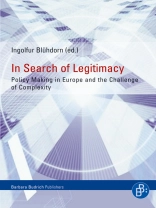In European societies social differentiation, value pluralism and international integration have brought about a condition of previously unknown complexity. Citizens’ expectations regarding political participation and the legitimization of government policy are rising, yet the capacities for social integration and political consensus formation may be in decline. This volume investigates how political actors and institutions in established European democracies are seeing to manage the condition of complexity and how this condition reconfigures the foundations of democratic politics. From the Contents: Legitimacy Crises, Efficiency Gaps, Democratic Deficits Efficiency versus Democracy: Conceptual Reconciliation of a Troubled Relationship? Citizens’ Expectations: Is what matters only what works? Re-engaging Citizens: Institutional Responses to Political Disengagement Informal Government Delegated Authority: Legitimizing Independent Regulatory Agencies Delegation to the EU The Open Method of Co-ordination (OMC) and The European Employment Strategy Committee Governance in EU Agricultural Policy Efficiency versus Legitimacy: The Governance of Technology Does citizen involvement improve the quality, legitimacy and implementability of environmental policy? The Allocation of Health Care The Post-democratic Turn: Complexity and the Reconfiguration of Democratic Politics
Про автора
Dr. Ingolfur Blühdorn, Reader (Associate Professor) in Politics / Political Sociology, Department of European Studies, University of Bath, UK












